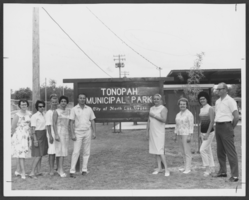Search the Special Collections and Archives Portal
Search Results
Nanyu Tomiyasu oral history interview
Identifier
Abstract
Oral history interview with Nanyu Tomiyasu conducted by Andrew Russell on March 22, 1987. In this interview, Tomiyasu discusses his father's large-scale commercial farm in Las Vegas, Nevada and the amount of produce the farm produced through the 1920s. He expands on the impact of the 1922 railroad strike, particularly in regard to the Japanese population in the city. He recounts the general lack of discrimination and segregation against Japanese residents in Las Vegas, how Japanese families integrated with the community and how they maintained their cultural traditions. Later, he begins to discuss the impact of World War II on Japanese in the people living in the western states, Las Vegas' response to its Japanese residents, and how relocation and internment impacted families.
Archival Collection
Anne Davis Mulford and Strutt Hurley oral history interview
Identifier
Abstract
Oral history interview with Anne Davis Mulford and Strutt Hurley conducted by Dennis McBride on June 7, 2002 and July 22, 2002 for the Las Vegas Gay, Lesbian, Bisexual and Transgender Archives Oral History Project. Mulford discusses her early life in the Northeast, including her experiences with a lesbian mother and how that affected her early life. She discusses her coming out and her move to Las Vegas, Nevada in the 1990s. Anne recalls her involvement in the LGBTQIA+ community in Las Vegas, including her work on the Las Vegas Pride parade and the beginnings of the LGBTQ Center of Southern Nevada. Finally, she talks about her work building AFAN, the Aid for AIDS of Nevada.
Archival Collection

Photograph of North Las Vegas Women's Club, North Las Vegas, July 22, 1965
Date
Archival Collection
Description
Image
Norma and Gil Schwartz oral history interview
Identifier
Abstract
Oral history interview with Norma and Gil Schwartz conducted by Stefani Evans and Claytee White on September 22, 2017, October 04, 2017, and February 14, 2018 for the Building Las Vegas Oral History Project. In the three interviews, the couple describes Gil’s leadership in the National Association of Real Estate Brokers (NAREB), properties that he’s built and developed, and purchasing blueprints of un(der)developed parcels in Las Vegas, Nevada on behalf of Howard Hughes's land agent, J. Herbert Nall.
Archival Collection
John Hardie Moss Jr. oral history interview
Identifier
Abstract
Oral history interview with John Hardie Moss Jr. conducted by Phyllis Sherwin on February 22, 1981 for the Ralph Roske Oral History Project on Early Las Vegas. In this interview, Moss discusses his career as a world-class poker player and professional gambler in Las Vegas, Nevada. Moss describes the intricacies of poker and gambling, gambling for high-stakes, and cheating in the gambling world.
Archival Collection
Ralph Vandersnick oral history interview
Identifier
Abstract
Oral history interview with Ralph Vandersnick conducted by Dennis McBride on October 18, 1997 for the Las Vegas Gay Archives Oral History Project. Vandersnick discusses growing up on a farm with his family in Illinois, owning a gay bar called the Studio Club in California, and owning another gay bar called Snick's Place when he moved to Las Vegas, Nevada in 1976.
Archival Collection
Ralph Denton oral history interview
Identifier
Abstract
Oral history interview with Ralph Denton conducted by Dennis McBride on June 05, 2007 for the Las Vegas Gay, Lesbian, Bisexual and Transgender Archives Oral History Project. In this interview, Denton discusses Fred Alward, Lieutenant Governor of Nevada in the 1930s, and his political campaign running for Governor in 1938. Denton talks about Alward having to drop out of the race because of the backlash he received for being gay.
Archival Collection
George Smith oral history interview
Identifier
Abstract
Oral history interview with George Smith conducted by Dennis McBride on June 28, 2002 for the Las Vegas Gay, Lesbian, Bisexual and Transgender Archives Oral History Project. In this interview, Smith discusses his life as a priest of the Christian Orthodox church and a gay man. He describes his experiences living in an Orthodox monastery, his interactions with the gay community of Las Vegas, Nevada since the 1960s, and other gay priests Smith has known. Smith also details bringing in speakers for talks with his gay congregation to provide information on topics including sexually transmitted diseases and careers. He concludes by discussing his involvement with gay student groups at the University of Nevada, Las Vegas.
Archival Collection
Tamara Pickett oral history interviews
Identifier
Abstract
Oral history interviews with Tamara Pickett conducted by Dennis McBride on November 01, 2002 and November 08, 2002 for the Las Vegas Gay Archives Oral History Project. In these interviews, Pickett discusses her early life and the traumatizing experiences that occurred during her childhood. Pickett remembers serving in the United States Army, beginning her transition to Tamara, and completing a sexual reassignment surgery in 1999. Later, Pickett talks about her activism work in Las Vegas, Nevada, campaigning for improved health care for transgender veterans, and her involvement with the transgender community in Las Vegas.
Archival Collection
John Warfel oral history interview
Identifier
Abstract
Oral history interview with John Warfel conducted by Dennis McBride on March 11, 1998 for the Las Vegas Gay, Lesbian, Bisexual and Transgender Archives Oral History Project. In this interview, Warfel discusses his personal history and his experiences as a gay priest within the Episcopal Church. He recalls moving to Las Vegas, Nevada and interviewing for a ministry job at Christ Church. Warfel describes same-sex blessings and marriages in the Episcopal Church and the pressures of vestry approval that he dealt with during his career.
Archival Collection
